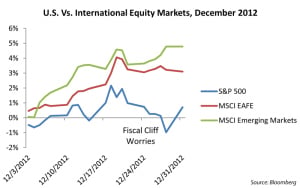I have spent a couple of days talking about the situation in Washington, and now it’s time to take another look at the country as a whole. Despite the fun and games in D.C., the real economy continues to improve in multiple ways. Let’s take a look at some.
First, employment. Today’s data shows that, overall, 155,000 jobs were added in December, just matching population growth. This is a reasonable number that should keep the unemployment rate stable, and that is what happened. Unemployment stayed steady at 7.8 percent, and the underemployment rate (which I prefer) remained stable at 14.4 percent. Not great news, but given the fiscal cliff uncertainty, not terrible either.






